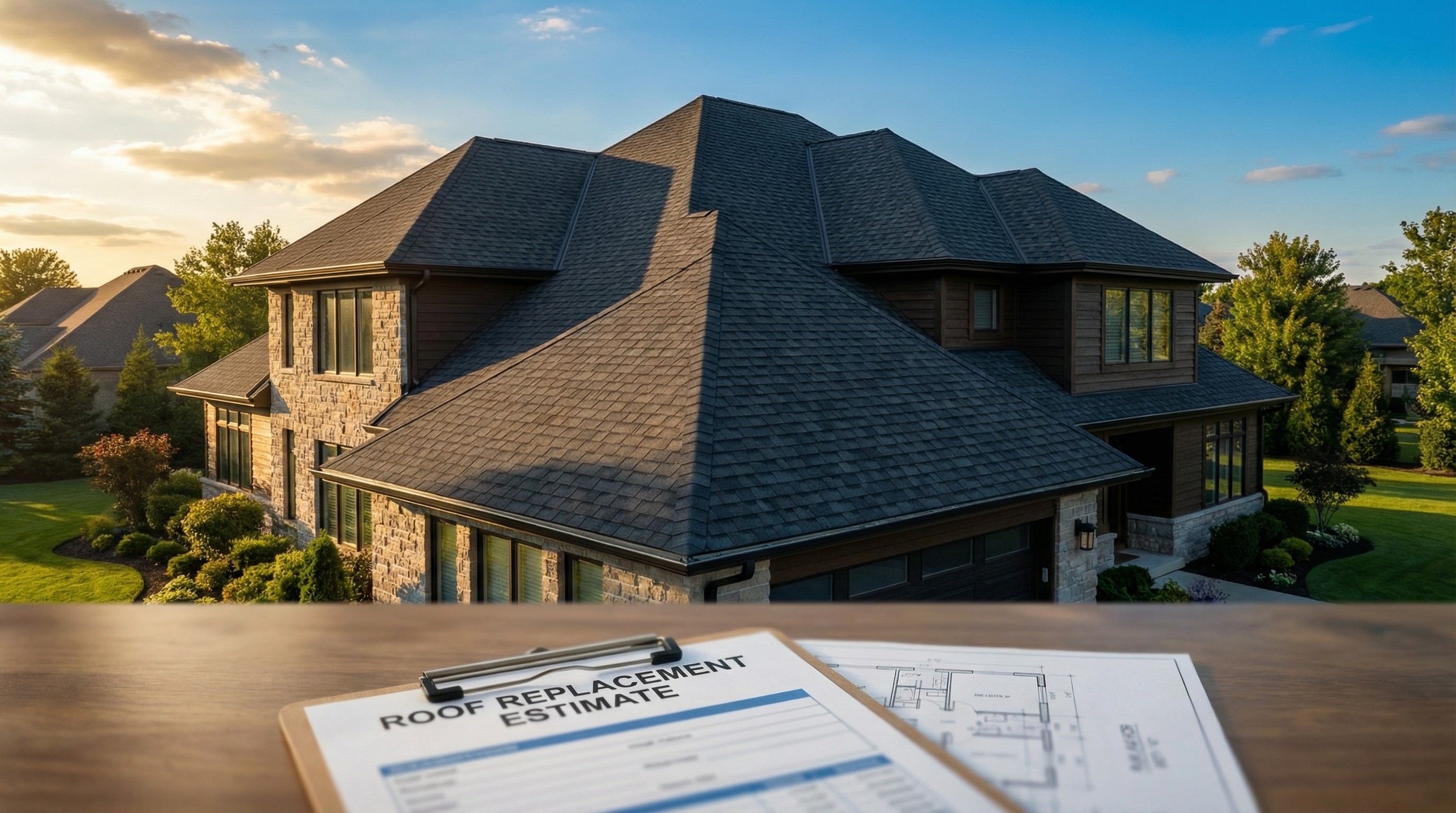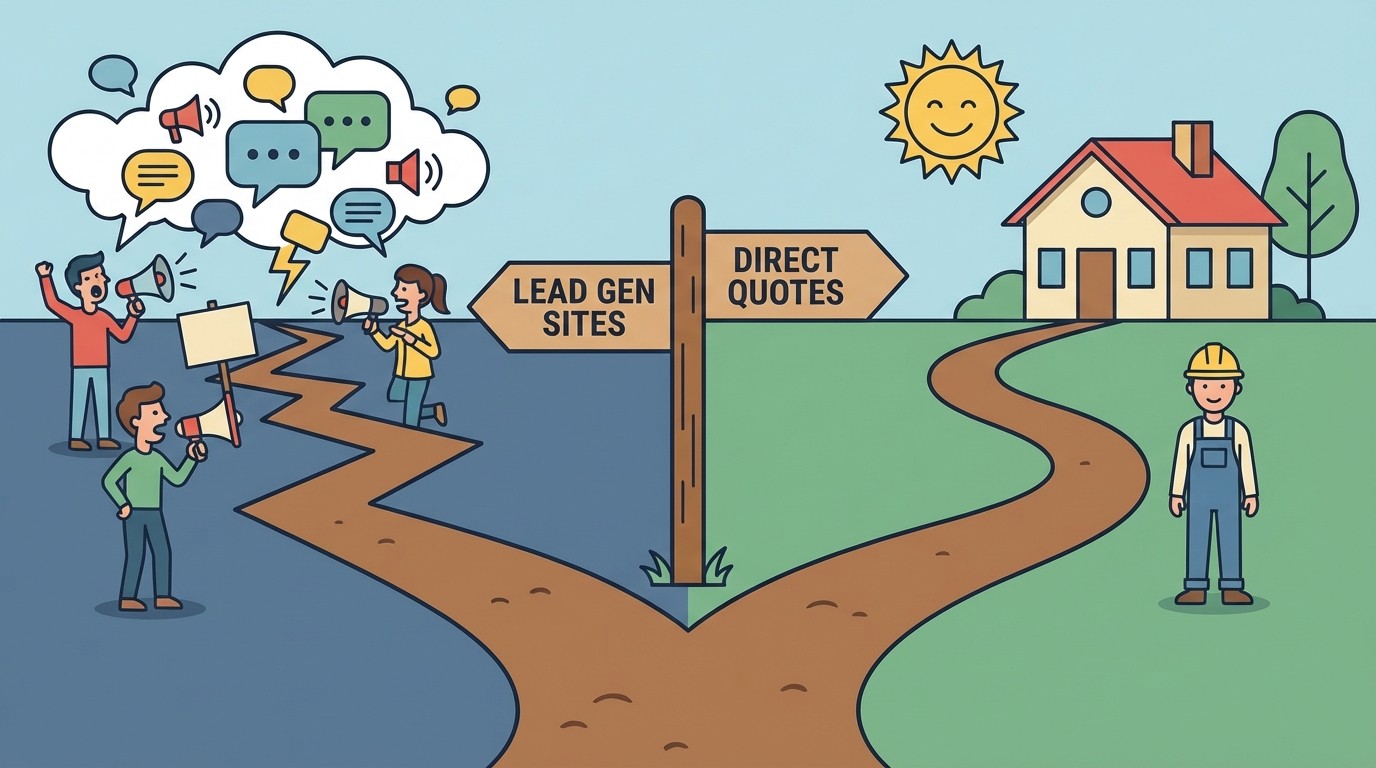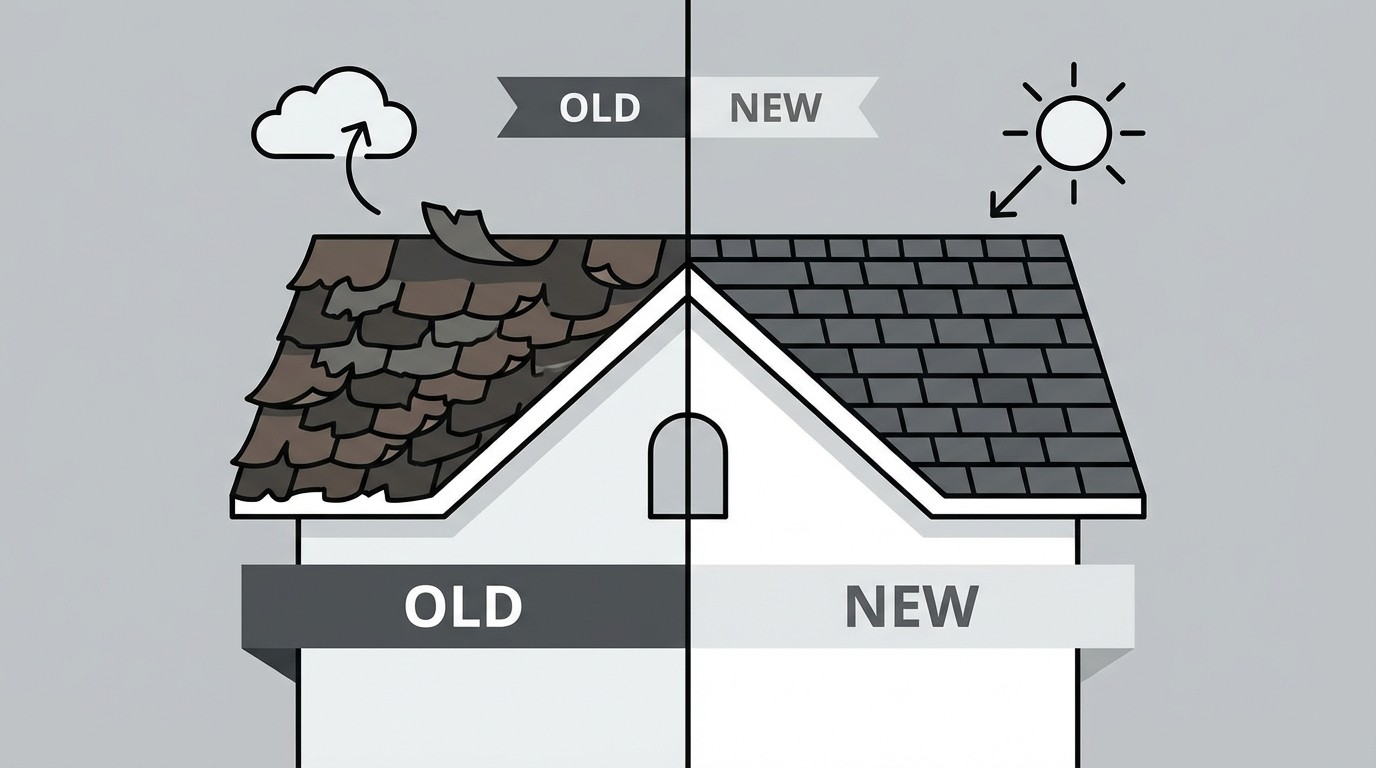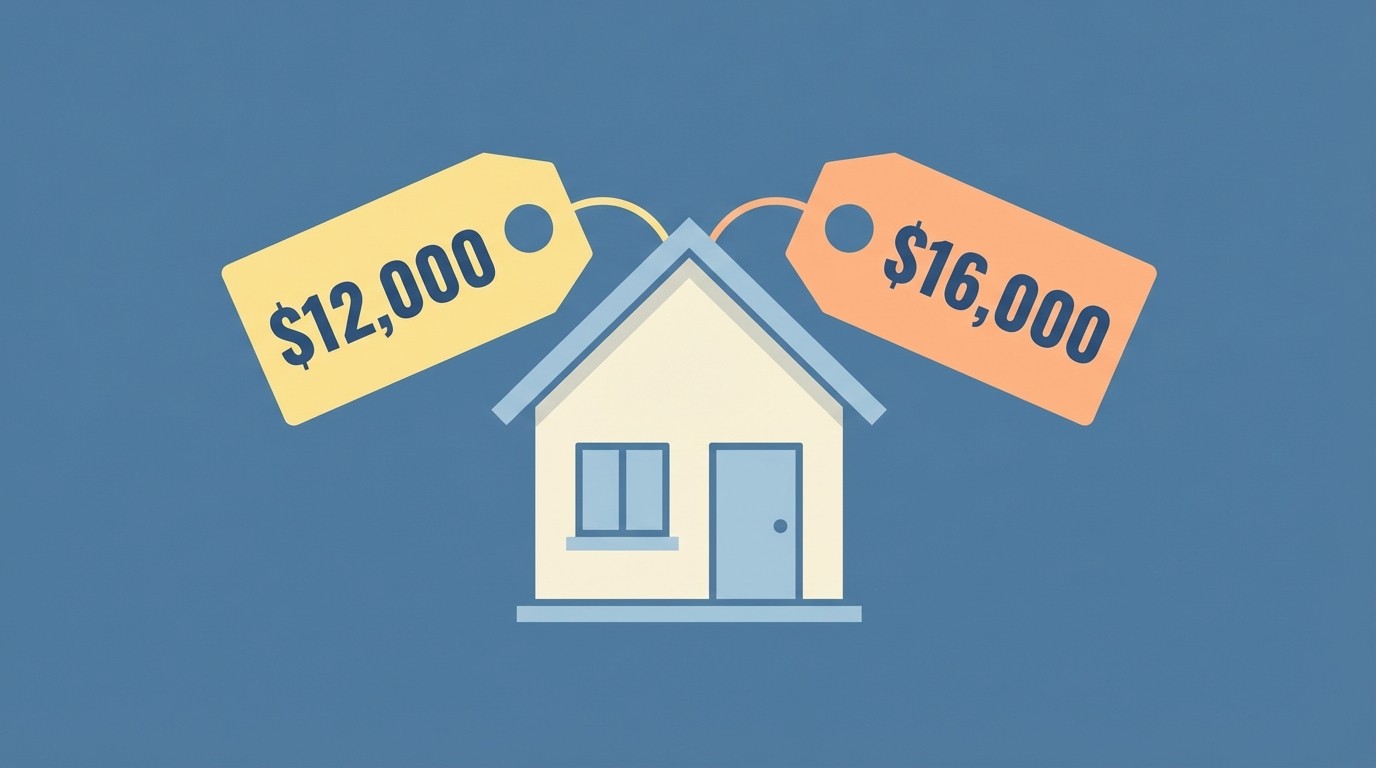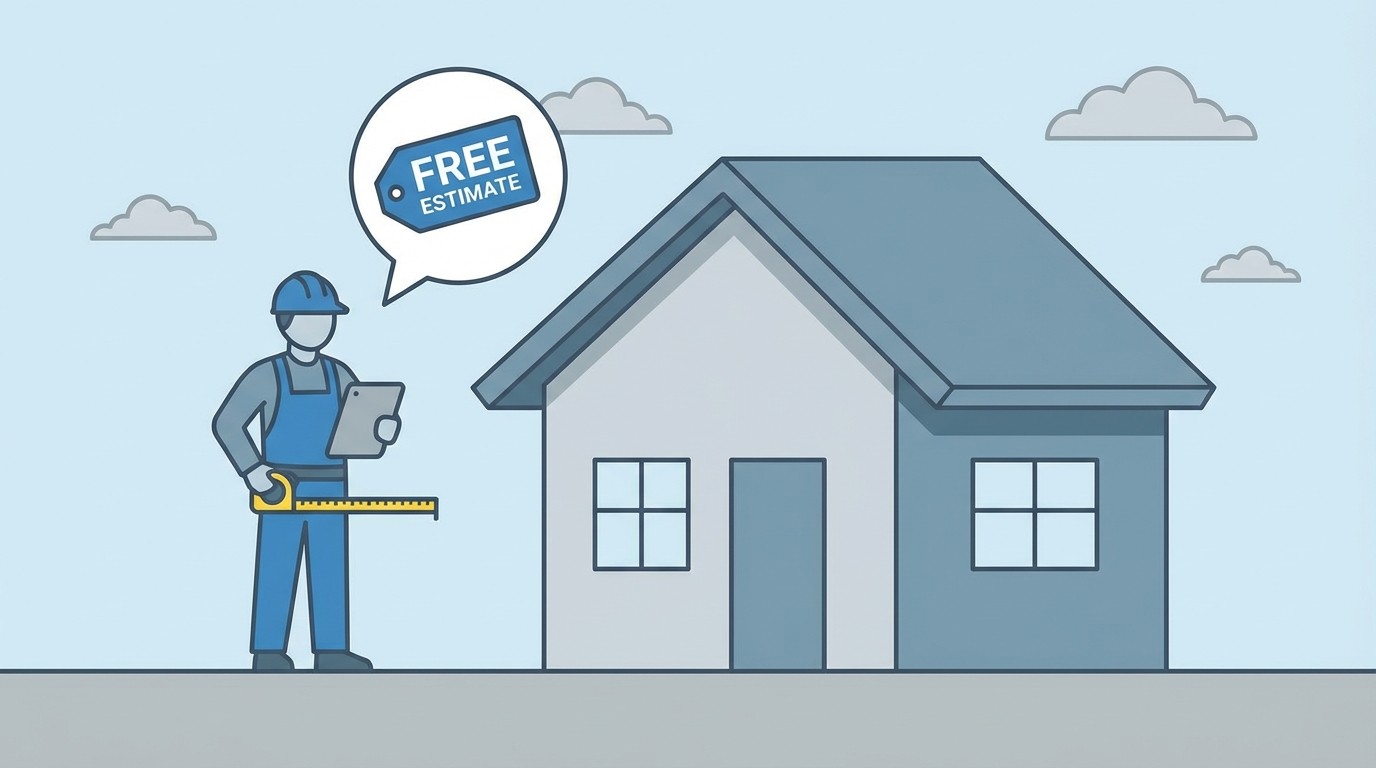Roof replacement cost is one of the biggest home expenses you'll face, and the price tag can feel like a mystery until you understand what goes into it. Quotes can range from $7,000 to $25,000 or more for the same house depending on who you call, which makes it hard to know whether you're getting a fair deal or being overcharged.
This guide breaks down exactly what drives roof replacement cost, what to expect for your specific situation, and how to make sure you're not overpaying.
What Does Roof Replacement Cost on Average?
Roof replacement cost typically ranges between $7,000 and $15,000 for most homeowners, with the national average falling around $10,000 to $12,000 for a standard asphalt shingle roof on a mid-sized home.
This wide price range reflects three key factors: your home's size, the materials you choose, and the complexity of the job.
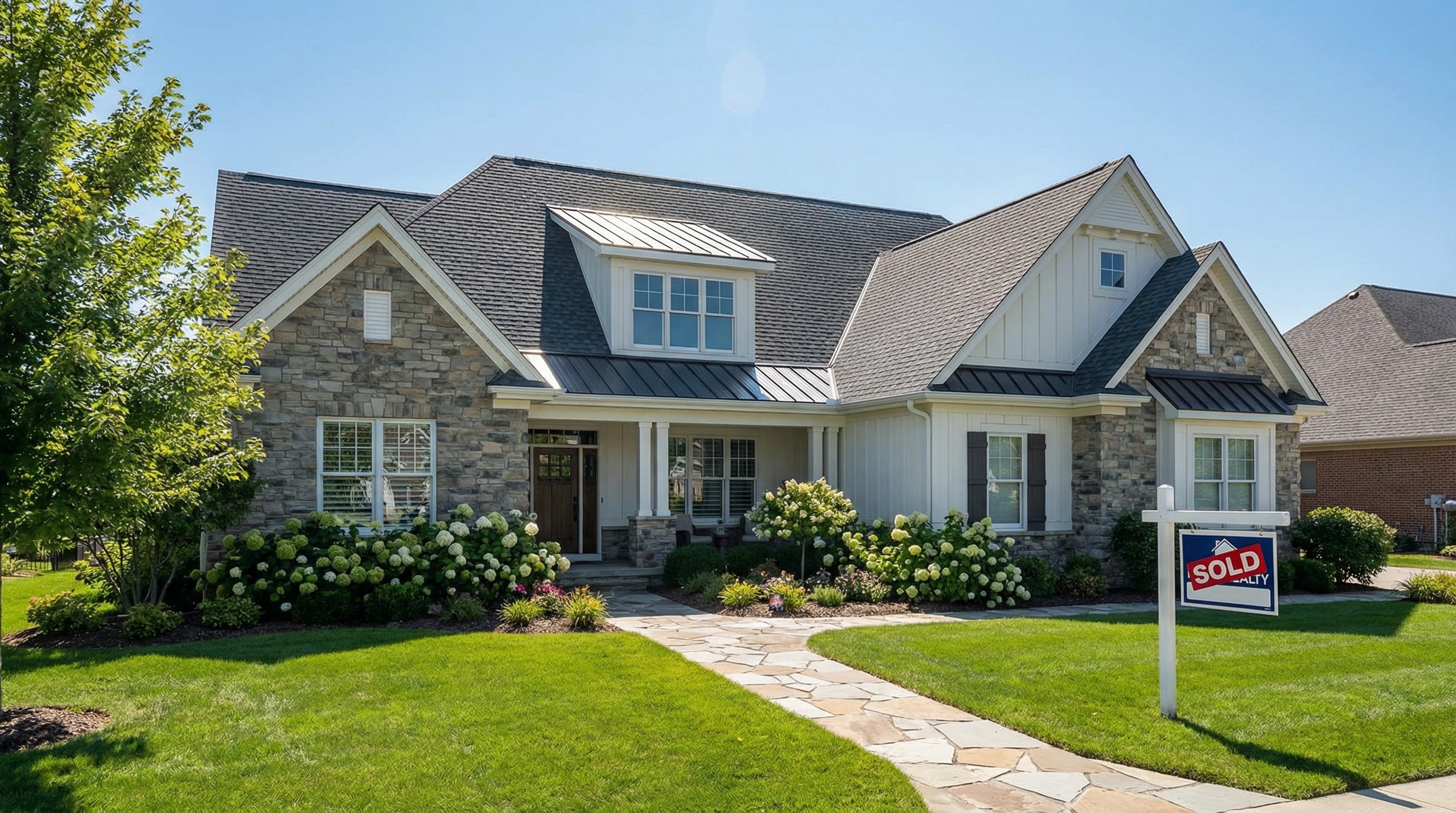
Here's how the price tiers generally break down:
Low end ($5,000 to $7,000): Smaller homes, basic three-tab shingles, simple roof shapes with minimal features[1]
Mid range ($8,000 to $15,000): Average-sized homes, architectural shingles, moderate roof complexity[1][2]
High end ($20,000 and up): Larger homes, premium materials like metal or slate, steep pitches, or roofs with many dormers, valleys, and skylights
Roof Replacement Cost by Square Footage
Your home's size is one of the most straightforward factors in determining roof replacement cost. It's often measured in 'squares' (100 sq ft). Larger roofs naturally cost more because they need more materials and labor.
Home Size | Typical Cost Range |
|---|---|
1,000 to 1,500 sq ft (10-15 squares) | $5,000 to $8,000 |
1,500 to 2,000 sq ft (15-20 squares) | $7,000 to $12,000 |
2,000 to 2,500 sq ft (20-25 squares) | $9,000 to $15,000 |
2,500 to 3,000 sq ft (25-30 squares) | $12,000 to $18,000 |
3,000+ sq ft (30+ squares) | $15,000 to $25,000+ |
1,000 to 1,500 Square Feet
Smaller homes, condos, and single-story ranches typically fall into this category. Projects at this size typically complete in a single day and represent the most affordable tier for roof replacement.
1,500 to 2,000 Square Feet
This size range typically offers the most competitive pricing from local roofers because it represents the most common project scope.
2,000 to 2,500 Square Feet
This is one of the most common home sizes for roof replacement projects.
2,500 to 3,000 Square Feet
Larger family homes with more roof area naturally cost more. At this size, your material choice starts making a bigger difference in the final number.
3,000 Square Feet and Larger
Estate homes and multi-story properties often have more complex roof designs with multiple angles and features. Expect higher costs due to both the increased square footage and the additional labor involved.
Roof Replacement Cost by Material Type
After size, material choice has the biggest impact on your total cost. Each roofing material comes with trade-offs between upfront price, how long it lasts, and how it looks on your home.
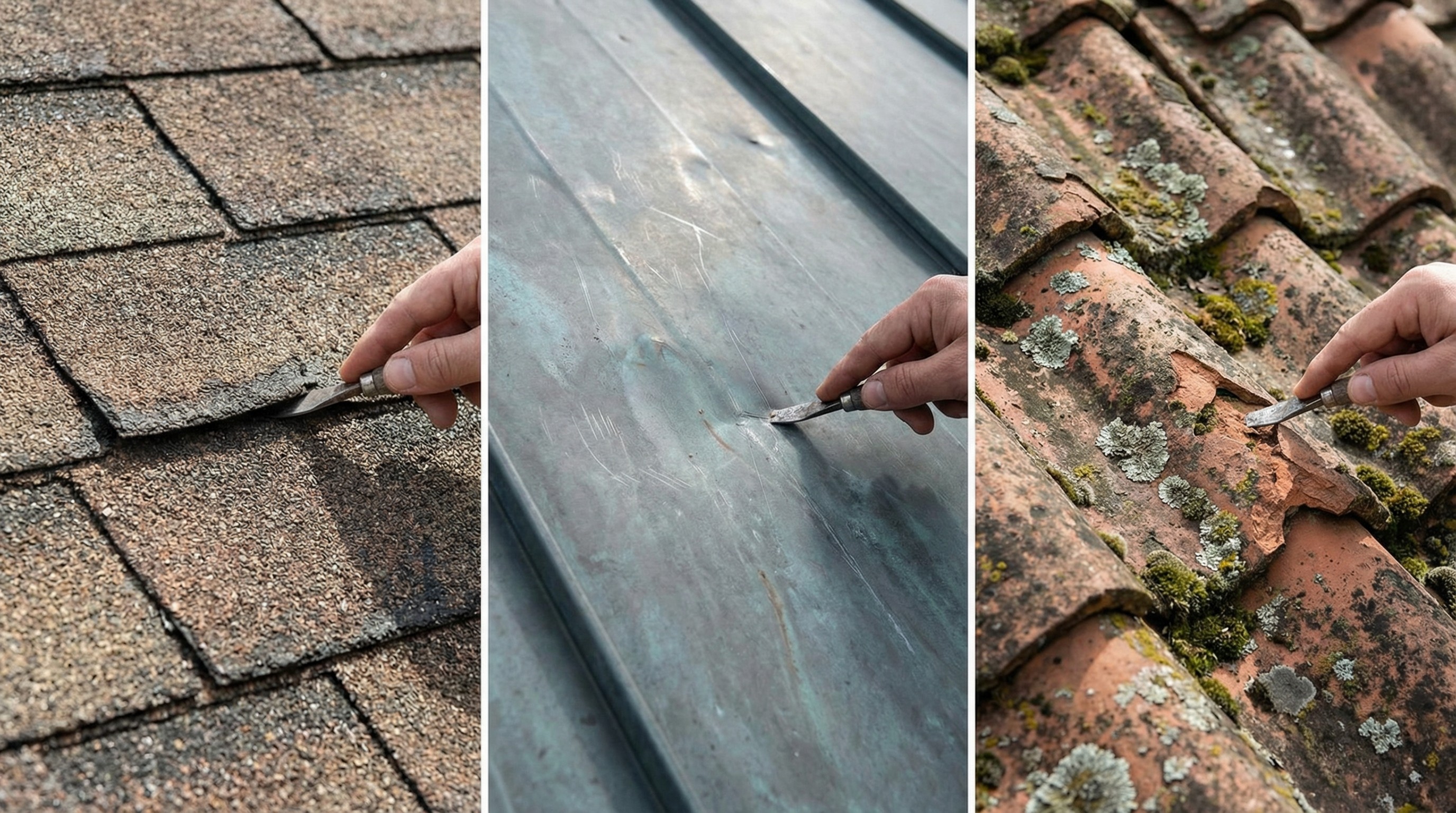
Material | Cost per Sq Ft | Typical Lifespan | Best For |
|---|---|---|---|
Three-tab asphalt | $3.50 to $5.50 | 15 to 20 years | Budget-conscious homeowners |
Architectural asphalt | $4.50 to $8.50 | 25 to 30 years | Most residential homes |
Metal shingles | $7 to $14 | 40 to 70 years | Durability without the industrial look |
Standing seam metal | $10 to $18 | 50+ years | Long-term investment |
Clay or concrete tile | $10 to $18 | 50+ years | Mediterranean or Spanish-style homes |
Wood shakes | $8 to $14 | 25 to 30 years | Natural, rustic aesthetic |
Slate | $15 to $30+ | 75 to 100+ years | Luxury and historic homes |
Three-Tab Asphalt Shingles
Three-tab shingles are the most budget-friendly option on the market. They offer a flat, uniform appearance and provide basic protection, though they have a shorter lifespan than other options and offer less wind resistance.
Architectural Asphalt Shingles
Also called dimensional shingles, architectural shingles are the most popular choice for residential roofs today. They're thicker than three-tab, offer better wind resistance, and have a more textured, layered appearance that many homeowners prefer.
Standing Seam Metal
Standing seam metal roofing features raised, interlocking seams that run vertically up the roof. The higher upfront investment delivers value through exceptional longevity, energy efficiency, and minimal maintenance over the decades.
Metal Shingles
Metal shingles offer a middle ground between asphalt and standing seam. You get the familiar look of traditional shingles combined with metal's durability and longer lifespan.
Clay and Concrete Tile
Tile roofing is common on Mediterranean and Spanish-style homes. Both clay and concrete tiles are heavy, so your roof structure may require reinforcement before installation.
Wood Shakes
Wood shakes provide a natural, rustic look that appeals to many homeowners. However, they require more maintenance than other materials and may face fire restrictions in certain areas.
Slate
Slate is the most expensive roofing material available, but it can last well over a century with proper care. Installation requires specialized expertise, and not every roof structure can support slate's weight.
What Affects the Cost to Replace a Roof
Two homes with the same square footage can get very different roofing quotes. Here is why prices vary:
Roof shape and pitch affect how hard the job is.
Some roofs have more features, like skylights or valleys.
Location changes labor rates and material costs.
Understanding these factors helps you make sense of the numbers you see.
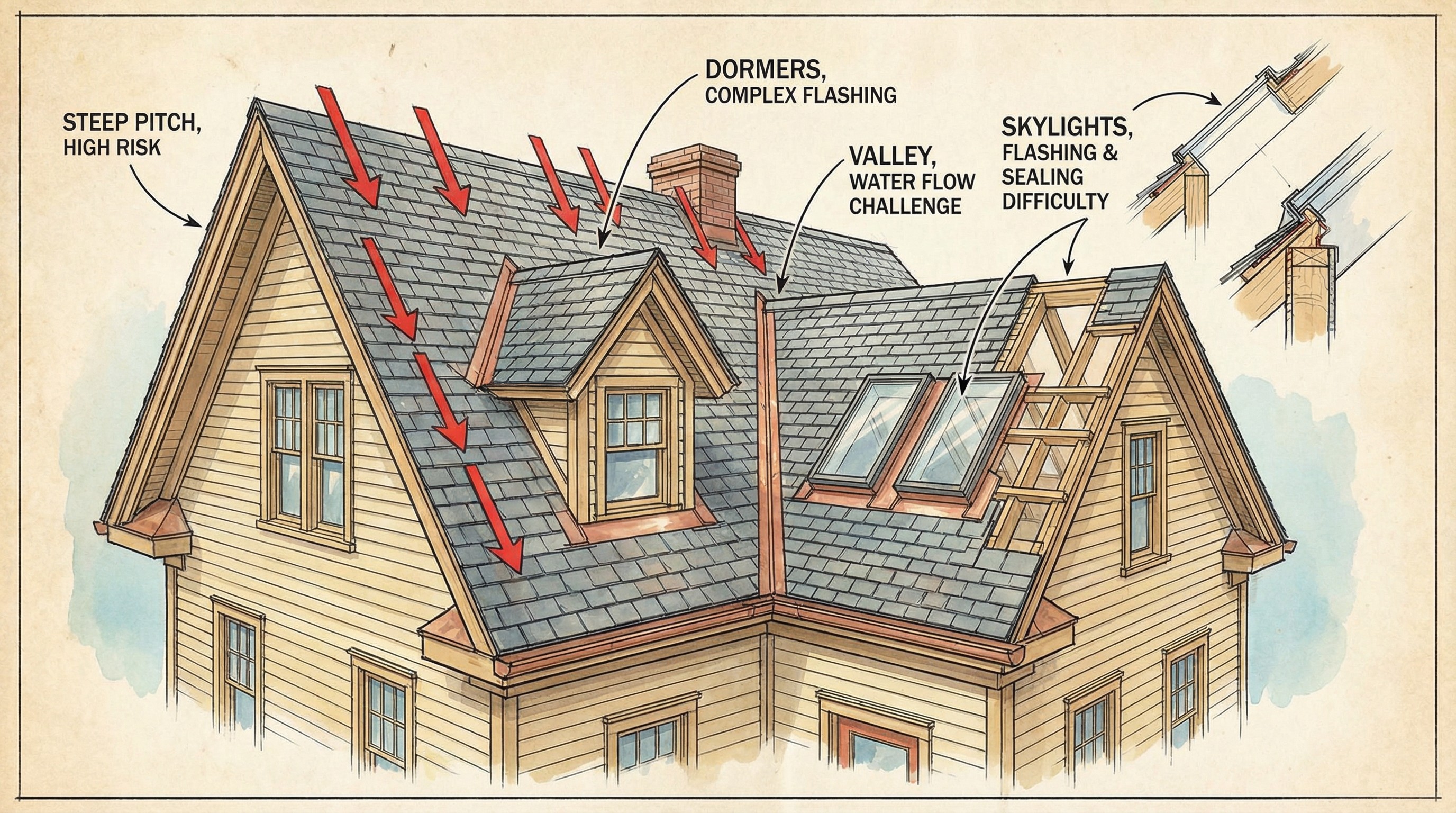
Roof Pitch and Steepness
Pitch refers to your roof's angle or slope. Steeper roofs are harder and more dangerous to work on, which increases labor costs. A roof with a 6/12 pitch (meaning it rises 6 inches for every 12 inches of horizontal run) or higher typically costs more than a low-slope roof.
Roof Shape and Complexity
A simple gable roof with two sloping sides costs less than a roof with multiple angles, valleys, dormers, and hips. More cuts, more custom flashing work, and more time on the job all add up.
Number of Shingle Layers to Remove
Some older roofs have two or even three layers of shingles stacked on top of each other. Removing multiple layers adds to tear-off time and disposal costs.
Roof Accessibility
If your home has limited access due to landscaping, fences, or multiple stories, crews may need extra equipment or time to get materials up and debris down. Clear, easy access keeps costs lower.
Chimneys, Skylights, and Vents
Every penetration in your roof requires custom flashing to prevent leaks. The more features your roof has, the more materials and labor hours go into the job.
Your Geographic Location
Labor rates, material availability, and permit fees vary by region. Chattanooga-area pricing may differ from national averages based on local market conditions and demand.
How Much Does Roofing Labor Cost?
Labor typically accounts for 40% to 60% of your total roof replacement cost.[1][2] This portion covers more than just the crew physically installing shingles on your roof.
Crew wages: The workers installing your new roof
Equipment and safety: Harnesses, scaffolding, ladders, and specialized tools
Cleanup and disposal: Hauling away old materials and leaving your property clean
Project management: Coordinating the job, ordering materials, and scheduling inspections
Here's something to understand: companies structure their pricing differently. Some pay their salespeople large commissions, while others may have lower overhead. Knowing how a roofer prices helps you compare quotes accurately.
Additional Roof Replacement Costs
Beyond materials and labor, several other line items may appear on your quote. Knowing what to expect helps you avoid surprises when the final number comes in.
Tear-Off and Disposal
Tear-off covers removing your old roofing materials and hauling them to a disposal site. Some quotes include this in the total price, while others list it as a separate line item.
Roof Decking Repairs
Decking refers to the wooden boards or plywood sheets underneath your shingles. If any sections are rotted or water-damaged, they'll require replacement before new shingles can go on.
Underlayment and Ice and Water Shield
Underlayment is a protective layer installed directly on the decking before shingles. Ice and water shield is a self-adhesive membrane applied in vulnerable areas like valleys and along the eaves to prevent ice dam damage.
Flashing and Pipe Boots
Flashing consists of metal pieces that seal joints around chimneys, walls, and roof edges. Pipe boots are rubber or metal covers that seal around plumbing vents where they penetrate the roof.
Permits and Inspections
Most cities require a permit for roof replacement. Permit fees typically range from $100 to $500 depending on your location and local requirements.
Fascia and Soffit Repairs
Fascia are the boards running along your roof's edges, and soffit is the material underneath the eaves. Damage to either is often discovered during replacement and may add to your total if repairs are needed.
How to Save Money on Roof Replacement Cost
There are several ways to lower your roof replacement cost without cutting corners on quality.
Get Multiple Quotes from Local Roofers
Comparing three to five quotes helps you understand what fair pricing looks like in your area.
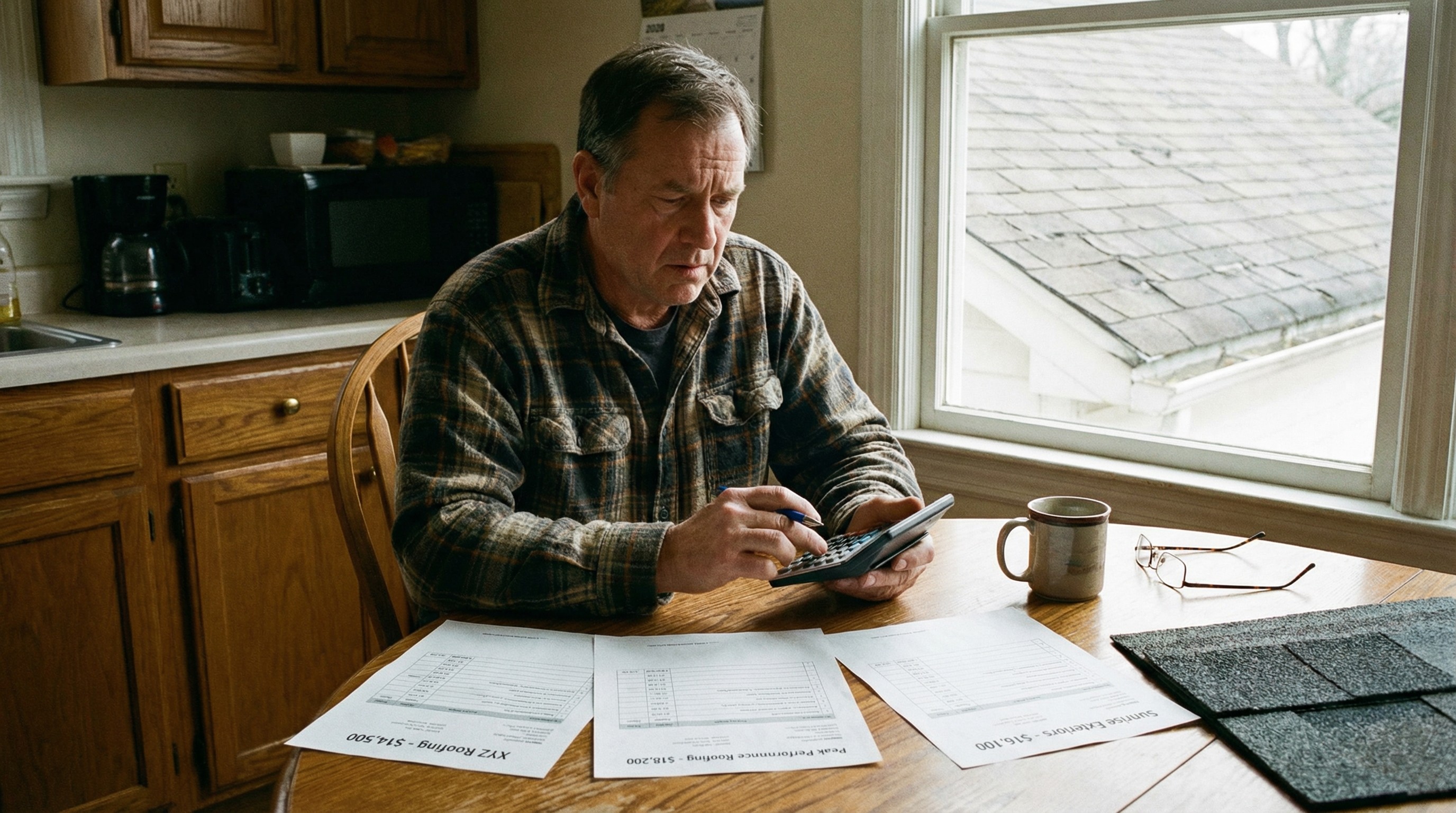
It also gives you leverage and context when evaluating each offer.
Avoid Roofers with High Sales Commissions
Companies that pay large sales commissions build those costs into every quote they give. Working with roofers who don't rely on commission-based sales can save you 15% to 20% on the same job.
Schedule Your Roof Replacement in the Off-Season
Late fall and winter are typically slower periods for roofers. You may find better pricing or faster scheduling during months when demand is lower.
Skip Upgrades You Don't Need
Premium underlayment and designer shingles are nice options, but not every roof requires them. Being honest about what you actually need versus what sounds appealing can keep your costs in check.
How to Compare Roofing Quotes Effectively
Roofing quotes can look completely different from one company to the next, which makes comparison tricky. Here's how to evaluate them fairly.
Look for Line-Item Pricing
A transparent quote breaks down each cost separately: materials, labor, tear-off, permits, and so on. Lump-sum quotes that don't show what you're paying for make it impossible to compare apples to apples.
Make Sure You're Comparing the Same Scope
One quote might include premium architectural shingles while another uses basic three-tab. Before comparing totals, confirm you're looking at the same shingle type, underlayment quality, and warranty coverage.
Watch for Missing or Vague Line Items
Warning signs include vague terms like "miscellaneous" or missing essential items like permits and disposal fees.
What a Fair Roofing Quote Includes
Every legitimate, professional quote contains certain elements. If any of the following are missing, ask questions before signing anything.
Materials: Brand, type, and quantity of shingles, underlayment, and flashing
Labor: Crew costs and estimated project timeline
Tear-off and disposal: How old materials will be removed and where they'll go
Permits: Who pulls them and what they cost
Warranty information: Details on both manufacturer coverage and workmanship guarantees
Payment terms: Deposit amount, payment schedule, and when final payment is due
How to Get Multiple Roof Quotes and Protect Your Investment
Getting multiple quotes is the single best way to ensure you are paying a fair price. But gathering quotes, comparing line items, and vetting contractors takes time that most homeowners don't have.
Consider using a service that gathers multiple vetted quotes from local roofers so you can compare prices more confidently. This helps you avoid hidden fees or inflated bids.
Remember to get multiple quotes from local contractors to ensure fair pricing.

